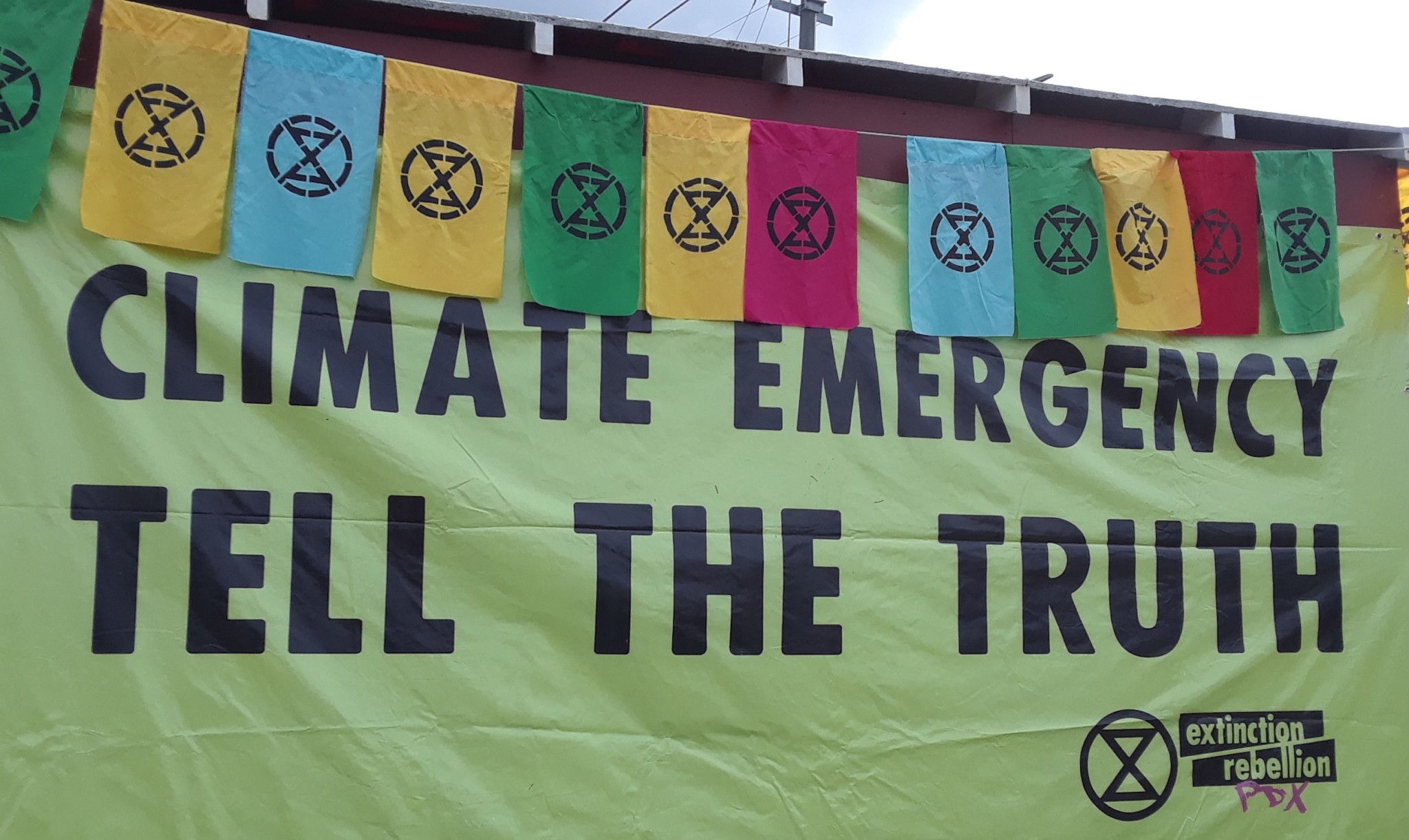Extinction Rebellion PDX agrees with the headline on the City’s Climate Emergency Workplan: “We are living in a climate emergency. It’s time for Portland to act like it.” Unfortunately the most recent City budget allocates less than .06% on climate change, and of that, only a small percentage is focused on emissions reductions, not exactly an emergency response.
The Workplan includes some good ideas, but also a lot of vague language without effective annual actions to reduce emissions and otherwise combat climate change.
In the two critical years since the passing of the Climate Emergency Declaration there are few, if any, substantive policies the City can point to that resulted in a substantial decline in emissions. According to the world’s top climate scientists (the International Panel on Climate Change), a substantial decline in emissions needs to begin by 2025 and be halved by 2030 to avoid unthinkable disaster. Instead of their vaguely aspirational “workplan,” Portland City Council must create a Climate Emergency Commission to work with the best available experts and committed and concerned stakeholders to work on effective action steps, measurable outcomes, responsible staff for various sectors, and timelines to reduce the city’s greenhouse gas emissions in line with climate science. Stakeholders should include members of communities most impacted by pollution and climate change currently. Stakeholders should not include representatives from businesses such as NW Natural, and other major contributors to the climate crisis.
In the transportation sector, the City must do everything possible to stop freeway expansions. We all know by know about induced demand: more lanes = more vehicle miles driven = bad for climate and local communities. Even if every car on the road was electric, those cars still generate carbon emissions and a host of other environmental harm. Instead the City must focus on electrifying, expanding, and incentivizing the costs of public transportation, and much better pedestrian and bike access. This work plan instead is focusing on an update of the Renewable Fuel Standards for a sixteen percent emission reduction, but as renewable expert Richard Plevin and others have pointed out, renewable fuels can actually have a negative impact on the climate, the environment, and public health and safety. Thus the City’s assumptions must be carefully vetted and they need to develop good policies that account for the complexity of bio/renewable fuels. The Pricing Options for Equitable Mobility (POEM) recommendations are great, good job City if you fully implement these in a timely manner, as in now, not years from now.
Few effective emission reduction actions are presented in the Buildings section and again without specific plans, measurable results, responsible parties or timelines in line with climate science. While we understand the systems life cycle benefits of a customized approach to building energy reductions, we are concerned with the time frame being discussed in terms both the ongoing energy cost burden on tenants (ranging from 18-45% of their necessary budget expenditures) as well as not adequately reducing emissions on the schedule required by climate science. The City should begin phasing in requirements next year starting with commercial buildings over 20,000sf. And then there is methane, which does not belong in homes. The City must implement internal air quality and temperature standards, beginning by working with Multnomah County to develop health standards to prevent methane (industry, in a stroke of green washing genius, likes to call it “natural gas”) appliances in new construction and eventually phasing out methane from existing homes. Studies make it clear that ventilation and even filtration are not sufficient solutions to the health and climate issues posed by methane, particulate matter, and nitrous oxide.
For both climate and public health, businesses and industry should not get off the hook for the next 10 years with no expected reductions in emissions, especially since behind the scenes industry pushed to kill the Portland Clean Air Protection program and many fought against Portland Clean Energy Fund.
In the trees section, despite calls by the Shade Equity Coalition, there is no mention of street tree planting maintenance, trees don’t help much if they are dead. The new Parks tree planting program is committing to less than half of the number of plantings that Friends of Trees has done in the past. The City departments must cooperate with one another to ensure that there are no more issues where one department includes trees in their designs but then when the construction is in progress another department ditches the trees. Perhaps the Water Bureau needs to work with urban forestry to learn about what is really important in terms of street tree plantings. Most importantly, there is no commitment to inventory and preserve giant old trees as community shade equity and sequestration resources or at least declare a moratorium on their cutting until the tree code can be revised.
The City makes a huge point out of the necessity of decreasing energy supply from fossil fuels towards truly clean, renewable sources which will only be effective if utility companies commit to doing it region wide. The City should immediately begin to invest in Community Controlled Energy programs and be willing to increase their commitment percentage beyond 10% if utilities do not meet timeline benchmarks.
Finally, the City should look at what other cities and states are actually implementing and follow in their footsteps.
With the federal government’s climate actions being essentially gutted by the Supreme Court and Joe Manchin, we are all counting on local governments everywhere to do the work. We are counting on you. You have a chance to be real climate leaders. For the sake of future generations and all the others we share this planet with you must do what your document starts with and act like we are living in a climate emergency, but really act, backed with big chunks of the budget, not teenie tiny crumbs.
[Submitted by Extinction Rebellion, PDX on August 23, 2022, one day before the Climate Emergency Workplan was unanimously approved by the City Council.]

